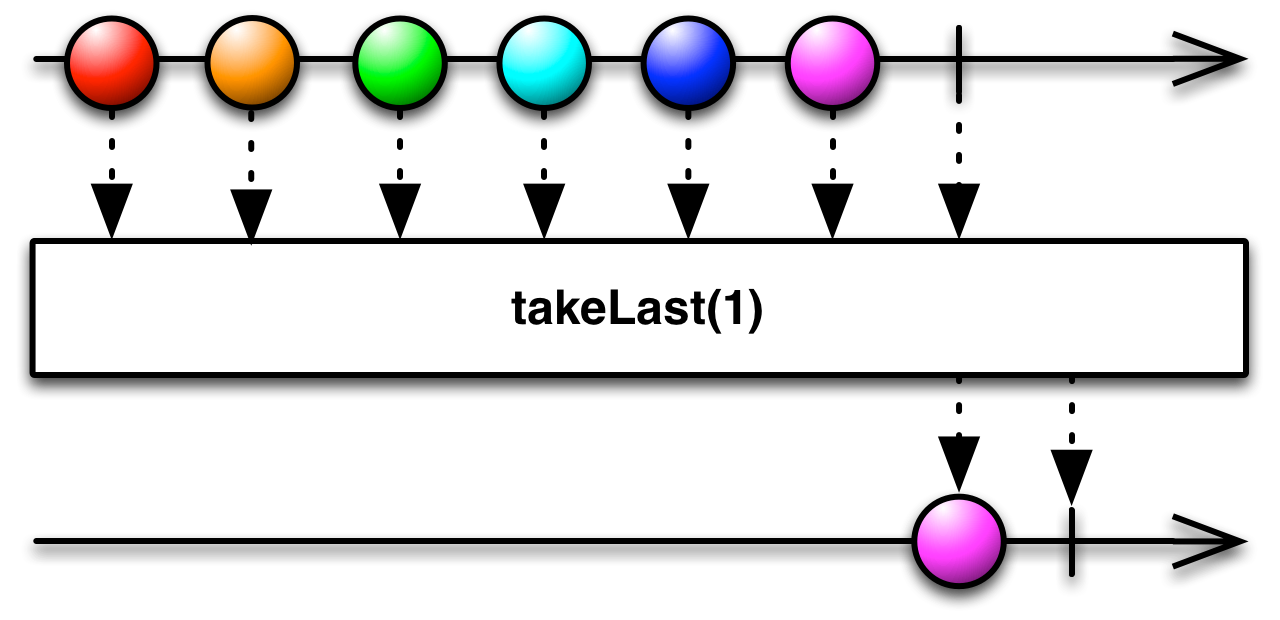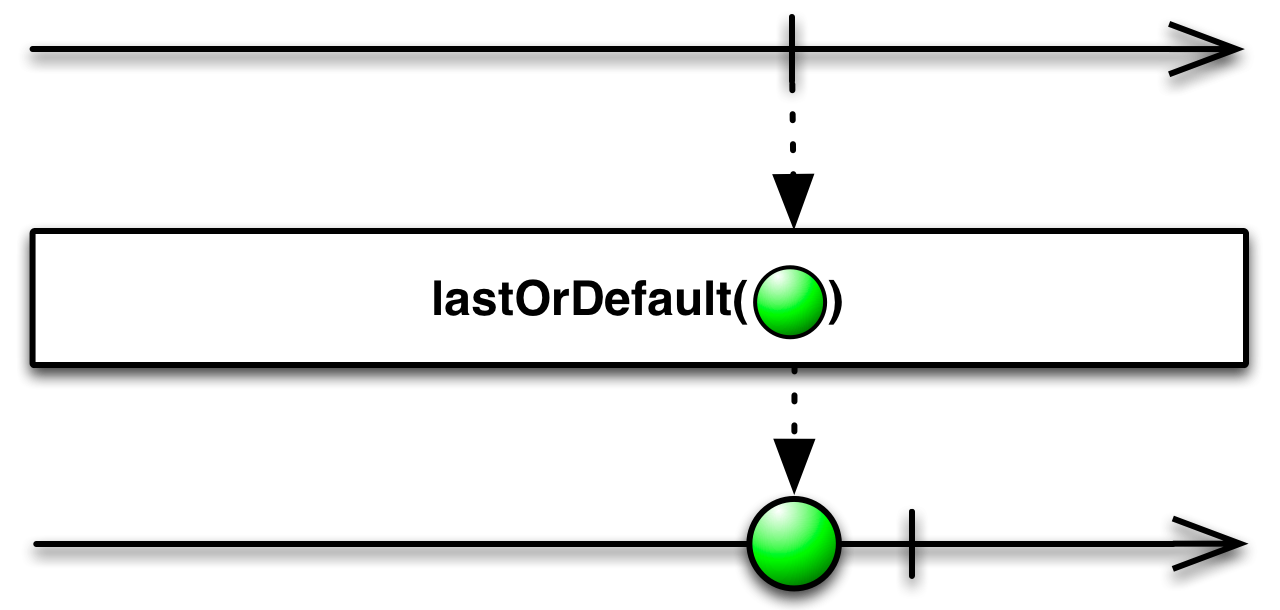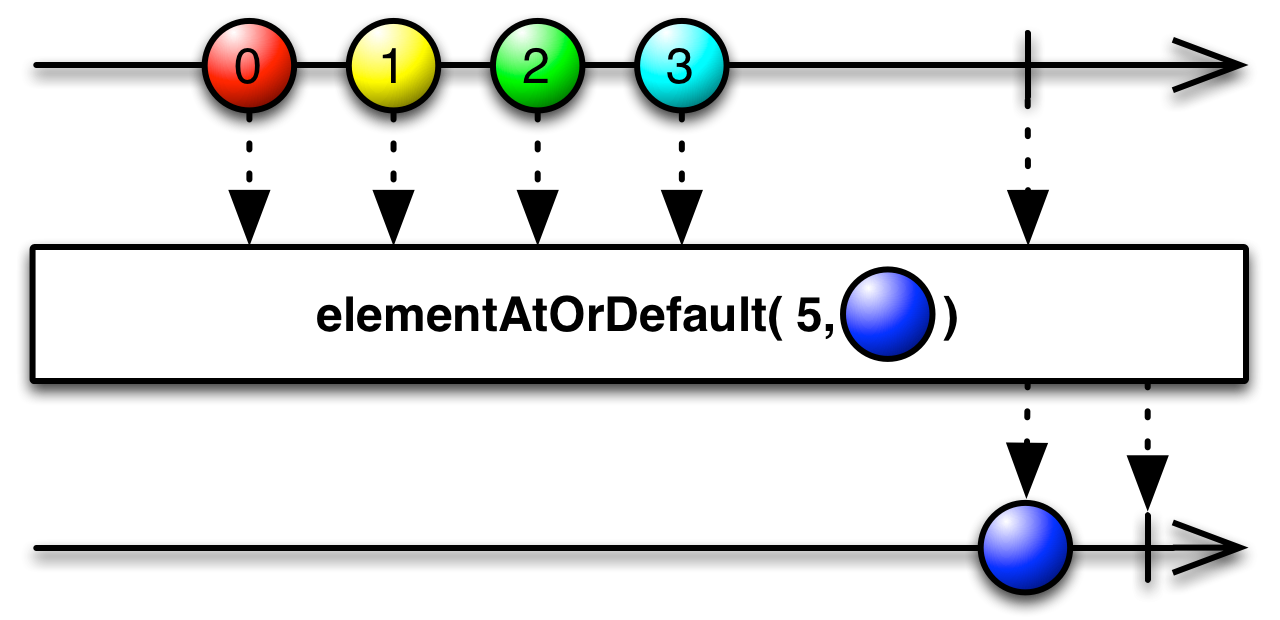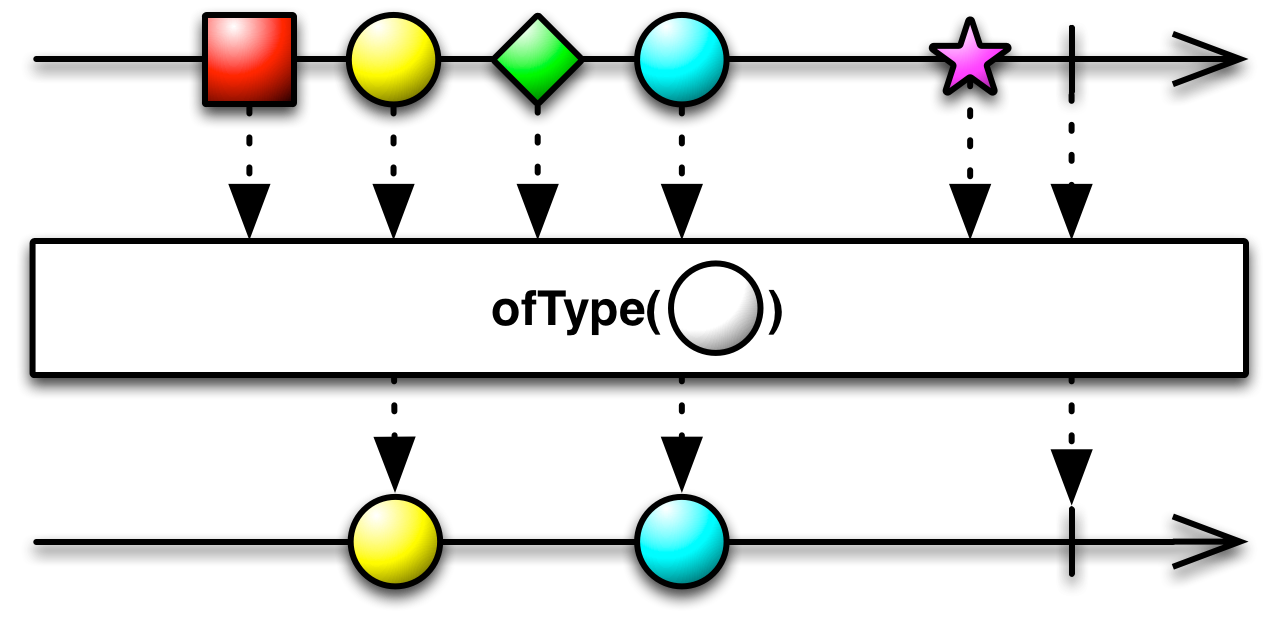-
Notifications
You must be signed in to change notification settings - Fork 0
Filtering Observables
This section explains operators you can use to filter and select items emitted by Observables.
-
filter( )— filter items emitted by an Observable -
takeLast( )— only emit the last n items emitted by an Observable -
last( )— emit only the last item emitted by an Observable -
lastOrDefault( )— emit only the last item emitted by an Observable, or a default value if the source Observable is empty -
takeLastBuffer( )— emit the last n items emitted by an Observable, as a single list item -
skip( )— ignore the first n items emitted by an Observable -
skipLast( )— ignore the last n items emitted by an Observable -
take( )— emit only the first n items emitted by an Observable -
first( )andtakeFirst( )— emit only the first item emitted by an Observable, or the first item that meets some condition -
firstOrDefault( )— emit only the first item emitted by an Observable, or the first item that meets some condition, or a default value if the source Observable is empty -
elementAt( )— emit item n emitted by the source Observable -
elementAtOrDefault( )— emit item n emitted by the source Observable, or a default item if the source Observable emits fewer than n items -
sample( )orthrottleLast( )— emit the most recent items emitted by an Observable within periodic time intervals -
throttleFirst( )— emit the first items emitted by an Observable within periodic time intervals -
throttleWithTimeout( )ordebounce( )— only emit an item from the source Observable after a particular timespan has passed without the Observable emitting any other items -
timeout( )— emit items from a source Observable, but issue an exception if no item is emitted in a specified timespan -
distinct( )— suppress duplicate items emitted by the source Observable -
distinctUntilChanged( )— suppress duplicate consecutive items emitted by the source Observable -
ofType( )— emit only those items from the source Observable that are of a particular class -
ignoreElements( )— discard the items emitted by the source Observable and only pass through the error or completed notification

You can filter an Observable, discarding any items that do not meet some test, by passing a filtering function into the filter( ) method. For example, the following code filters a list of integers, emitting only those that are even (that is, where the remainder from dividing the number by two is zero):
numbers = Observable.from([1, 2, 3, 4, 5, 6, 7, 8, 9]);
numbers.filter({ 0 == (it % 2) }).subscribe(
{ println(it); }, // onNext
{ println("Error: " + it.getMessage()); }, // onError
{ println("Sequence complete"); } // onCompleted
);2
4
6
8
Sequence complete
- javadoc:
filter(predicate) - Linq:
Where - RxJS:
filter - Introduction to Rx: Where

To convert an Observable that emits several items into one that only emits the last n of these items before completing, use the takeLast( ) method. For instance, in the following code, takeLast( ) emits only the last integer in the list of integers represented by numbers:
numbers = Observable.from([1, 2, 3, 4, 5, 6, 7, 8, 9]);
numbers.takeLast(1).subscribe(
{ println(it); }, // onNext
{ println("Error: " + it.getMessage()); }, // onError
{ println("Sequence complete"); } // onCompleted
);9
Sequence complete
There are also versions of takeLast( ) that emit the items that were emitted by the source Observable during a specified window of time before the Observable completed, or that emit a maximum of n items from such a window.
- javadoc:
takeLast(count) - Linq:
TakeLast - RxJS:
takeLastandtakeLastWithTime - Introduction to Rx: Last

The last( ) operator is equivalent to takeLast(1) except that it will throw an NoSuchElementException if the source Observable does not emit at least one item. Note that there is also a BlockingObservable implementation of last( ).
- Table of similar blocking and non-blocking operators
- javadoc:
last( )andlast(predicate) - RxJS:
last - Linq:
lastAsync
emit only the last item emitted by an Observable, or a default value if the source Observable is empty

The lastOrDefault( ) operator returns an Observable that emits the last item emitted by the source Observable, or a default item if the source Observable does not emit at least one item. Note that there is also a BlockingObservable implementation of lastOrDefault( ).
- Table of similar blocking and non-blocking operators
- javadoc:
lastOrDefault(default)andlastOrDefault(default, predicate) - RxJS:
lastOrDefault - Linq:
lastOrDefaultAsync

To convert an Observable that emits several items into one that emits the last n of these items as a single list before completing, use the takeLastBuffer( ) method. There are also versions of takeLastBuffer( ) that emit a list containing the items that were emitted by the source Observable during a specified window of time before the Observable completed, or a maximum of n items from such a window.
def numbers = Observable.from([1, 2, 3, 4, 5, 6, 7, 8]);
numbers.takeLastBuffer(3).subscribe(
{ println(it); }, // onNext
{ println("Error: " + it.getMessage()); }, // onError
{ println("Sequence complete"); } // onCompleted
);[6, 7, 8]
Sequence complete
- javadoc:
takeLastBuffer(count) - javadoc:
takeLastBuffer(time, timeunit)andtakeLastBuffer(time, timeunit, scheduler) - javadoc:
takeLastBuffer(count, time, timeunit)andtakeLastBuffer(count, time, timeunit, scheduler) - RxJS:
takeLastBufferandtakeLastBufferWithTime

You can ignore the first n items emitted by an Observable and attend only to those items that come after, by modifying the Observable with the skip(n) method.
numbers = Observable.from([1, 2, 3, 4, 5, 6, 7, 8, 9]);
numbers.skip(3).subscribe(
{ println(it); }, // onNext
{ println("Error: " + it.getMessage()); }, // onError
{ println("Sequence complete"); } // onCompleted
);4
5
6
7
8
9
Sequence complete
There are also versions of skip() that ignore the items emitted by an Observable during a specified period of time after the Observable is subscribed to.
- javadoc:
skip(num) - javadoc:
skip(time, timeunit)andskip(time, timeunit, scheduler) - Linq:
Skip - RxJS:
skip - Introduction to Rx: Skip and Take

You can ignore the last n items emitted by an Observable and attend only to those items that preced them, by modifying the Observable with the skipLast(n) method. Note that the mechanism by which this is implemented will delay the emission of any item from the source Observable until n additional items have been emitted by that Observable.
There are also versions of skipLast() that ignore the items emitted by an Observable during a specified period of time before the Observable completes.
- javadoc:
skipLast(count) - javadoc:
skipLast(time, timeunit)andskipLast(time, timeunit, scheduler) - Linq:
SkipLast - RxJS:
skipLast - Introduction to Rx: SkipLast and TakeLast

You can choose to pay attention only to the first n items emitted by an Observable by calling its take(n) method. That method returns an Observable that will invoke an Subscriber’s onNext method a maximum of n times before invoking onCompleted. For example,
numbers = Observable.from([1, 2, 3, 4, 5, 6, 7, 8, 9]);
numbers.take(3).subscribe(
{ println(it); }, // onNext
{ println("Error: " + it.getMessage()); }, // onError
{ println("Sequence complete"); } // onCompleted
);1
2
3
Sequence complete
If you call take(n) on an Observable, and that Observable emits fewer than n items before completing, the new, take-modified Observable will not throw an exception or invoke onError(), but will merely emit this same fewer number of items before it completes.
- javadoc:
take(num) - javadoc:
take(time, timeunit)andtake(time, timeunit, scheduler) - Linq:
Take - RxJS:
take - Introduction to Rx: Skip and Take

To create an Observable that emits only the first item emitted by a source Observable (if any), use the first( ) method.
 You can also pass a function to this method that evaluates items as they are emitted by the source Observable, in which case
You can also pass a function to this method that evaluates items as they are emitted by the source Observable, in which case first( ) will create an Observable that emits the first such item for which your function returns true (if any).
takeFirst( ) behaves very similarly to first( ) with the exception of how they behave when the source Observable emits no items (or no items that match the predicate). In such a case, first( ) will throw an NoSuchElementException while takeFirst( ) will return an empty Observable (one that calls onCompleted( ) but never calls onNext( )).

- Table of similar blocking and non-blocking operators
- javadoc:
first() - javadoc:
first(predicate) - javadoc:
takeFirst() - javadoc:
takeFirst(predicate) - Linq:
firstAsync - RxJS:
first - Introduction to Rx: First
emit only the first item emitted by an Observable, or the first item that meets some condition, or a default value if the source Observable is empty

To create an Observable that emits only the first item emitted by a source Observable (or a default value if the source Observable is empty), use the firstOrDefault( ) method.
 You can also pass a function to this method that evaluates items as they are emitted by the source Observable, in which case
You can also pass a function to this method that evaluates items as they are emitted by the source Observable, in which case firstOrDefault( ) will create an Observable that emits the first such item for which your function returns true (or the supplied default value if no such item is emitted).
- Table of similar blocking and non-blocking operators
- javadoc:
firstOrDefault(default) - javadoc:
firstOrDefault(predicate,default) - Linq:
firstOrDefaultAsync - RxJS:
firstOrDefault - Introduction to Rx: First

Pass elementAt( ) a zero-based index value and it will emit the solitary item from the source Observable's sequence that matches that index value (for example, if you pass the index value 5, elementAt( ) will emit the sixth item emitted by the source Observable). If you pass in a negative index value, or if the source Observable emits fewer than index value + 1 items, elementAt( ) will throw an IndexOutOfBoundsException.
- javadoc:
elementAt(index) - Linq:
ElementAt - RxJS:
elementAt - Introduction to Rx: ElementAt
emit item n emitted by the source Observable, or a default item if the source Observable emits fewer than n items

Pass elementAtOrDefault( ) a zero-based index value and it will emit the solitary item from the source Observable's sequence that matches that index value (for example, if you pass the index value 5, elementAtOrDefault( ) will emit the sixth item emitted by the source Observable). If you pass in a negative index value, elementAtOrDefault( ) will throw an IndexOutOfBoundsException. If the source Observable emits fewer than index value + 1 items, elementAtOrDefault( ) will emit the default value you pass in (you must also pass in a type for this value that is appropriate to what type your Subscribers expect to observe).
- javadoc:
elementAtOrDefault(index,default) - Linq:
ElementAtOrDefault - RxJS:
elementAtOrDefault

Use the sample( ) method to periodically look at an Observable to see what item it is emitting at a particular time.
The following code constructs an Observable that emits the numbers between one and a million, and then samples that Observable every ten milliseconds to see what number it is emitting at that moment.
def numbers = Observable.range( 1, 1000000 );
numbers.sample(10, java.util.concurrent.TimeUnit.MILLISECONDS).subscribe(
{ println(it); }, // onNext
{ println("Error: " + it.getMessage()); }, // onError
{ println("Sequence complete"); } // onCompleted
);339707
547810
891282
Sequence complete
- javadoc:
sample(period,unit)andsample(period,unit,scheduler) - javadoc:
throttleLast(period,unit)andthrottleLast(period,unit,scheduler) - Linq:
Sample - RxJS:
sample - Introduction to Rx: Sample

Use the throttleFirst( ) method to periodically look at an Observable to see what item it emitted first during a particular time span. The following code shows how an Observable can be modified by throttleFirst( ):
Scheduler s = new TestScheduler();
PublishSubject<Integer> o = PublishSubject.create();
o.throttleFirst(500, TimeUnit.MILLISECONDS, s).subscribe(
{ println(it); }, // onNext
{ println("Error: " + it.getMessage()); }, // onError
{ println("Sequence complete"); } // onCompleted
);
// send events with simulated time increments
s.advanceTimeTo(0, TimeUnit.MILLISECONDS);
o.onNext(1); // deliver
o.onNext(2); // skip
s.advanceTimeTo(501, TimeUnit.MILLISECONDS);
o.onNext(3); // deliver
s.advanceTimeTo(600, TimeUnit.MILLISECONDS);
o.onNext(4); // skip
s.advanceTimeTo(700, TimeUnit.MILLISECONDS);
o.onNext(5); // skip
o.onNext(6); // skip
s.advanceTimeTo(1001, TimeUnit.MILLISECONDS);
o.onNext(7); // deliver
s.advanceTimeTo(1501, TimeUnit.MILLISECONDS);
o.onCompleted();1
3
7
Sequence complete
only emit an item from the source Observable after a particular timespan has passed without the Observable emitting any other items

Use the throttleWithTimeout( ) method to select only those items emitted by a source Observable that are not quickly superceded by other items.
- javadoc:
throttleWithTimeout(timeout,unit)ordebounce(timeout,unit) - javadoc:
throttleWithTimeout(timeout,unit,scheduler)ordebounce(timeout,unit,scheduler) - Linq:
Throttle - RxJS:
throttle - Introduction to Rx: Throttle
emit items from a source Observable, but issue an exception if no item is emitted in a specified timespan

The timeout( ) operator emits the items emitted by a source Observable unless the source Observable fails to emit an item within a specified period of time since the previous item it emitted, in which case timeout( ) will call onError( ) with a TimeoutException.
Another version of timeout( ) does not call onError( ) but instead switches to emitting items from an alternative Observable if the original Observable fails to emit an item within the specified timeout period:

- javadoc:
timeout(time,unit)andtimeout(time,unit,scheduler) - javadoc:
timeout(time,unit,fallback)andtimeout(time,unit,fallback,scheduler) - Linq:
Timeout - RxJS:
timeoutandtimeoutWithSelector - Introduction to Rx: Timeout

Use the distinct( ) method to remove duplicate items from a source Observable and only emit single examples of those items.

You can also pass a function or a comparator into distinct( ) that customizes how it distinguishes between distinct and non-distinct items.
- javadoc:
distinct() - javadoc:
distinct(keySelector) - Linq:
Distinct - RxJS:
distinct - Introduction to Rx: Distinct and DistinctUntilChanged

Use the distinctUntilChanged( ) method to remove duplicate consecutive items from a source Observable and only emit single examples of such items.

You can also pass a function or a comparator into distinctUntilChanged( ) that customizes how it distinguishes between distinct and non-distinct items.
- javadoc:
distinctUntilChanged() - javadoc:
distinctUntilChanged(keySelector) - Linq:
DistinctUntilChanged - RxJS:
distinctUntilChanged - Introduction to Rx: Distinct and DistinctUntilChanged

- javadoc:
ofType(class) - Linq:
OfType - Introduction to Rx: Cast and OfType
discard the items emitted by the source Observable and only pass through the error or completed notification

- javadoc:
ignoreElements() - Linq:
IgnoreElements - RxJS:
ignoreElements - Introduction to Rx: IgnoreElements
A Netflix Original Production
Tech Blog | Twitter @NetflixOSS | Twitter @RxJava | Jobs
sidebar